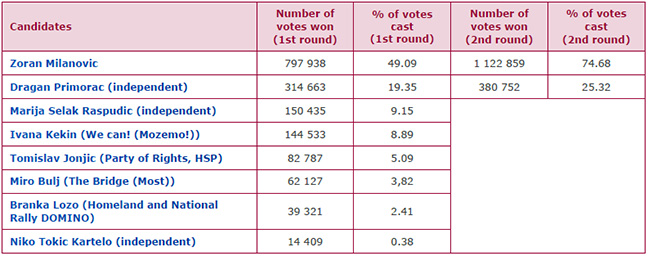Results
Elections in Europe
Corinne Deloy
-

Available versions :
EN

Corinne Deloy
The outgoing head of state, Zoran Milanovic, was re-elected by a large margin with 74.68% of the vote, the highest result for a head of state since the country regained its independence in 1991. "Not only did Zoran Milanovic retain his supporters, but he also gained the confidence of new voters," said Dragan Bagic, professor of political science at the University of Zagreb. He soundly defeated independent Dragan Primorac, supported by Prime Minister Andrej Plenkovic's Democratic Union (HDZ), the Patriotic Movement (DP), the Croatian Party of Pensioners (HSU), the Christian Democratic Party (HDS), the Social Liberal Party (HSLS), the People's Party/Liberal Democrats (HNS-LD) and the Independents, who took 25.32% of the vote.
Zoran Milanovic, supported by the Social Democratic Party (SDP), the Farmers' Party (HSS), the People's Party-Reformists (NS-R), the Independent Northern Platform (NPS), the Bloc of Pensioners (BUZ), Dalija Oreskovic and the People with a First Name and a Surname (DO i SIP), the Liberal Civic Alliance (GLAS), the Democratic Alliance of Medimurje (MDS), the Party of Pensioners (SU) and the Centre Party (Centar), narrowly failed to win the election in the first round of voting on 29 December, when it obtained 49.09% of the vote.
Zoran Milanovic won 90% of the vote in Istria, 87.10% in Medimurje and more than 80% in three other counties: Varazdin, Krapina-Zagorje and Primorje-Gorski Kotar. Finally, he won 79.50% of the vote in Zagreb. Dragan Primorac won over 40% of the vote in the county of Lika-Senj and 30% or more in the counties of Slavonia, Dalmatia, Sisak-Moslavina and Karlovac.
Turnout was 44.18%, slightly down on the first round of voting on 29 December 2024 (-1.83 points).
Results of the presidential elections in Croatia on 29 December 2024 and 12 January 2025
Turnout: 46.01% (1st round) and 44.18% (2nd round)

Source : https://www.izbori.hr/pre2024/rezultati/1/ and https://www.izbori.hr/pre2024/rezultati/2/
"Thank you, Croatia! I see this victory as recognition of my work over the last 5 years and a plebiscite message from the Croatian people to those who should hear it. I ask them to hear it. This is what the people wanted to express - it's not just a question of support for me," declared Zoran Milanovic when the results were announced.
The Croatians seem satisfied with the cohabitation they have imposed on their leaders: a right-wing government and a left-wing president. Voters seem to have wanted to counterbalance the government by keeping Zoran Milanovic in power, a well-known opponent of Prime Minister Andrej Plenkovic and the country's most popular politician. This result is undeniably a setback for the head of government.
‘Zoran Milanovic is a kind of political omnivore (...) In the space of a few years, he has created the image of someone who says out loud what everyone else is thinking,’ says Zarko Puhovski, philosopher and political scientist. ‘Zoran Milanovic is one of those people who understood that having an anti-system message was important and that it could mobilise a broader electoral base. He has understood that being the candidate of a social-democratic party is not enough and that you have to represent an alternative to the system’ emphasised Romain Le Quiniou, Director General of Eurocreative, which works on Central and Eastern Europe. ‘Since a constitutional reform in July 2001, the President of the Republic, although elected by universal suffrage since 1992, has basically had no executive powers. So, he is relatively paralysed. But he does have the power of speech, and he allows himself this, particularly in foreign policy,’ declared Joseph Krulic, historian and political scientist.
Zoran Milanovic said that the European Union was an ‘undemocratic institution in many respects. This is not the modern Europe in which I want to live and work’, he declared, adding “I will try to change it as much as I can as President of a small nation”.
Zoran Milanovic, 58, from Zagreb, graduated in law from the University of Zagreb. A diplomat in the Ministry of Foreign Affairs during the country's war of independence in the 1990s, he carried out various missions for this ministry, as well as for the UN and the European Union. In 1999, he joined the Social Democratic Party (SDP) and in 2002 became deputy foreign minister. Five years later, he became leader of the SDP and Prime Minister following the parliamentary elections of 4 December 2011, a position he held until his defeat at the hands of Andrej Plenkovic in the parliamentary elections of 11 September 2016. Zoran Milanovic then retired from political life to work as a consultant. He stood in the presidential elections of 22 December 2019 and 5 January 2020, which he won against outgoing President Kolinda Grabar-Kitarovic, supported by the Croatian Democratic Union.
Zoran Milanovic is the third president to be re-elected to the supreme magistracy, after Franjo Tudman (HDZ), considered to be the father of Croatian independence, who was head of state between 1990 and 1999, and Stjepan Mesic (HDZ), head of state from 2000 to 2010.
On the same theme
To go further
Elections in Europe
Corinne Deloy
—
20 January 2026
Elections in Europe
Corinne Deloy
—
13 January 2026
Elections in Europe
Corinne Deloy
—
4 November 2025
Elections in Europe
Corinne Deloy
—
28 October 2025

The Letter
Schuman
European news of the week
Unique in its genre, with its 200,000 subscribers and its editions in 6 languages (French, English, German, Spanish, Polish and Ukrainian), it has brought to you, for 15 years, a summary of European news, more needed now than ever
Versions :



